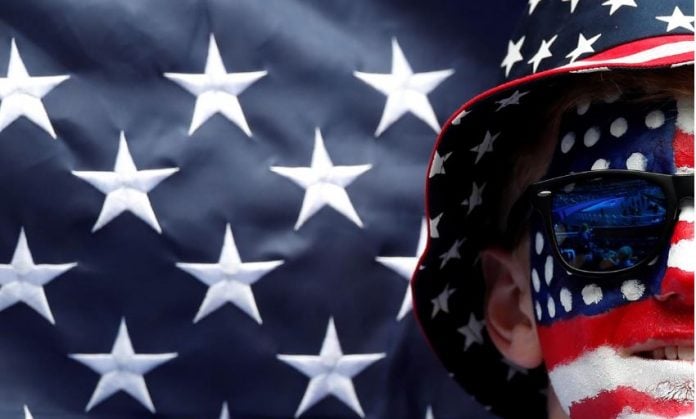Thousands of exuberant U.S. soccer fans have descended on France for the Women’s World Cup, soaking up the sights and sounds of Paris and other cities while reveling in the electric performances of the Stars and Stripes team.
The goal, as the tagline on tour T-shirts makes clear, is for the U.S. team to carry home its World Cup number four, a tally representing half the World Cups since it began in 1991.
Plenty of women’s national teams have large followings, such as Australia’s Matildas, England’s Lionesses, Brazil’s Canaries or Les Bleues of France.
But it’s the U.S. team, with its roster of star players, that has created the biggest buzz and reinforced a sense that the competition is taking women’s sport to a new level of international awareness.
“I’ve been to plenty of USA matches,” said Angelica Lopez, a 35-year-old from California who has been a member of The American Outlaws, the semi-official fanclub of the men’s and women’s teams, for the past three years.
“Nothing compares to this experience at the World Cup.”
Out of the 1.05 million tickets sold for the month-long competition so far, more than 100,000 were purchased by American fans, according to Erwan Le Prevost, director of the World Cup Local Organising Committee.
Teams like England, the Netherlands and host-nation France are pulling big crowds to games, but nothing quite like the U.S. team, which has sold out stadiums in Reims, Paris and, on Thursday night, Le Havre during its group matches.
The driving force is the Outlaws, set up in 2007 as a hardcore national fanclub. Despite criticism over the years for occasional raucous behaviour, they boast more than 30,000 members in nearly 200 national chapters.
It’s a far cry for the hooliganism prevalent in British and European soccer in the 1980s. The Outlaws include men and women as well as plenty of younger fans. Ahead of games, they organise barbecues and parties rather than punch-ups.
CHANTING AND SINGING
Still the group prides itself on creating the sort of intensity that’s more typically seen in European men’s soccer, regardless of the gender of the players.
Before every U.S. game of the World Cup, Outlaws have marched to the match, chanting and singing, clad in red, white and blue, sometimes with a police escort.
Thousands of Outlaws supported the U.S. team in 2015 and ticket and tour packages for this year’s tournament have sold out. According to one fanclub official, members have purchased the vast majority of the overall U.S. ticket allotment.
Nora Maguire White, an American fan in Le Havre for Thursday’s 2-0 win over Sweden, said the mood reminded her of 1999, the year the U.S. women won the Cup for the second time with an all-star squad including Mia Hamm.
Since then, interest in women’s soccer has skyrocketed in the United States and elsewhere, and Maguire White said she saw this year’s competition adding further energy to the sport.
“The hope is … there will be an explosion well beyond what is already happening, after the World Cup is gone and for many years to come,” said the 49-year-old, a career soccer coach, league organizer and former U.S. lacrosse player.
The quality of the competition in France, most notably from the French national side, would help attract more fans and interest, she said.
Despite the enthusiasm for the U.S. team in France, the sentiment is not always shared across the United States.
Gender discrepancies remain at the professional level. The U.S. team that won the Women’s World Cup in 2015 and other players have filed a lawsuit against the U.S. Soccer Federation accusing it of gender discrimination over unequal pay.
“We as women are having to fight to justify our place,” Maguire White said.
Yet turnout for the World Cup suggests the sport has a strong future. Matches have smashed French TV viewing figures, 12 stadiums have sold out and 20 are expected to do so once the semi-final and final matches are announced, Le Prevost said.
“It’s an enormous success of popularity and media coverage,” Le Prevost told Reuters. “We are lucky to welcome the entire world here in France.”














